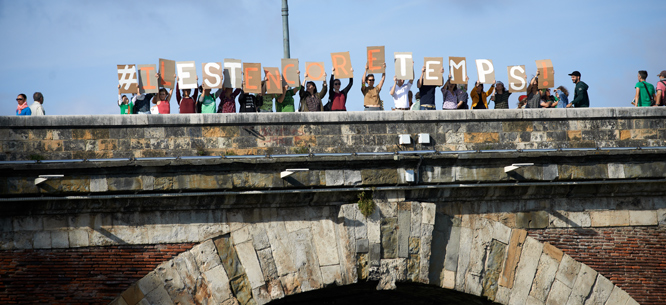Hot & Bothered Podcast: What the Climate Doomsayers Get Wrong
Hot & Bothered Podcast: What the Climate Doomsayers Get Wrong
Facing a deluge of doom-and-gloom reporting on the latest report from the Intergovernmental Panel on Climate Change (IPCC), Kate and Daniel get together to put things in perspective.

Facing a deluge of doom-and-gloom reporting on the latest report from the Intergovernmental Panel on Climate Change (IPCC), Kate and Daniel get together to put things in perspective—and, along the way, manage to find hope for a more equal, low-carbon future.
Continue the conversation on Twitter: tag us @KateAronoff, @aldatweets, @dissentmag, and #hotbotheredclimate. You can find links to all the articles mentioned in this episode, and lots more related reading and listening, below. And if you like what you’re hearing, please subscribe to Dissent. You’ll get our latest issue, featuring a special section on housing, and plenty more great Kate and Daniel content in the months to come.
[contentblock id=3]
[contentblock id=2]
[contentblock id=10]
[contentblock id=3]
Further reading
At Davos, bosses paint climate change as an opportunity (Alex Whiting, Reuters)
California just adopted its boldest energy target yet: 100% clean electricity (David Roberts, Vox)
The left vs. a carbon tax (David Roberts, Vox, 2016)
A Green New Deal is on the ballot in Washington state this year (David Roberts, Vox)
Kate: Climate Change Policy Is Proving Difficult To Enact Even in Liberal States with Democratic Control (The Intercept)
The Green Jobs Revolution Needs to Include All of Us (Audrea Lim, The Nation)
The Economy During Wartime (J.W. Mason, Dissent)
“Unhappy with what the military was paying for steel, Bernard Baruch, head of the First World War–era War Industries Board informed U.S. Steel chairman Elbert Gary that if prices didn’t come down, the government would simply take the industry over. When an incredulous Gary asked how U.S. Steel could be managed without its top executives, Baruch replied, ‘Oh, we’ll get a second lieutenant or somebody to run it.’”
Kate: Is Nationalization an Answer to Climate Change? (The Intercept)
Dems damp down hopes for climate change agenda (Timothy Cama and Mike Lillis, The Hill)
Kate: Valuing the World, with Mariana Mazzucato (Dissent)
“A carbon-neutral city will require innovation in mobility, nutrition, and how we build houses—all sorts of different areas. At the bottom of that are questions about how to transform government instruments. . . .”
Daniel: It Gets Wetter (Dissent)
“No matter what the earth system’s tipping points ultimately are, every fraction of a degree of warming that we avoid means saving millions of lives.”
Kate: The U.S. Decided to Show Up for the U.N. Climate Conference — to Lobby for Coal (The Intercept, 2017)
“Of the 17 operational large-scale carbon capture and storage (CCS) facilities worldwide, the vast majority funnel captured carbon dioxide back into oil extraction, or ‘enhanced oil recovery.’ That fact that has led some to coin the acronym CCUS: Carbon Capture, Utilization, and Storage, a nod to the fact that captured emissions aren’t always stored.”
The World We’ve Built (Jedediah Purdy, Dissent)
“The scientists’ warning is addressed to ‘humanity’ . . . On one level, the phrases name a bare fact.
“On another level, the ‘humanity’ that the self-described ‘world scientists’ address does not exist. There is no ‘we’ that could take the actions that the scientists call for. . . . To face the Anthropocene, humans would need a way of facing one another. We would need, first, to be a we.”
Explainer: How ‘Shared Socioeconomic Pathways’ explore future climate change (Carbon Brief)
Video: Resisting Extractivism and Climate Change (Panel at “The Future of the Left in the Americas,” hosted by Dissent, NACLA, and the New School)
Daniel: The Last Stimulus (Jacobin)




